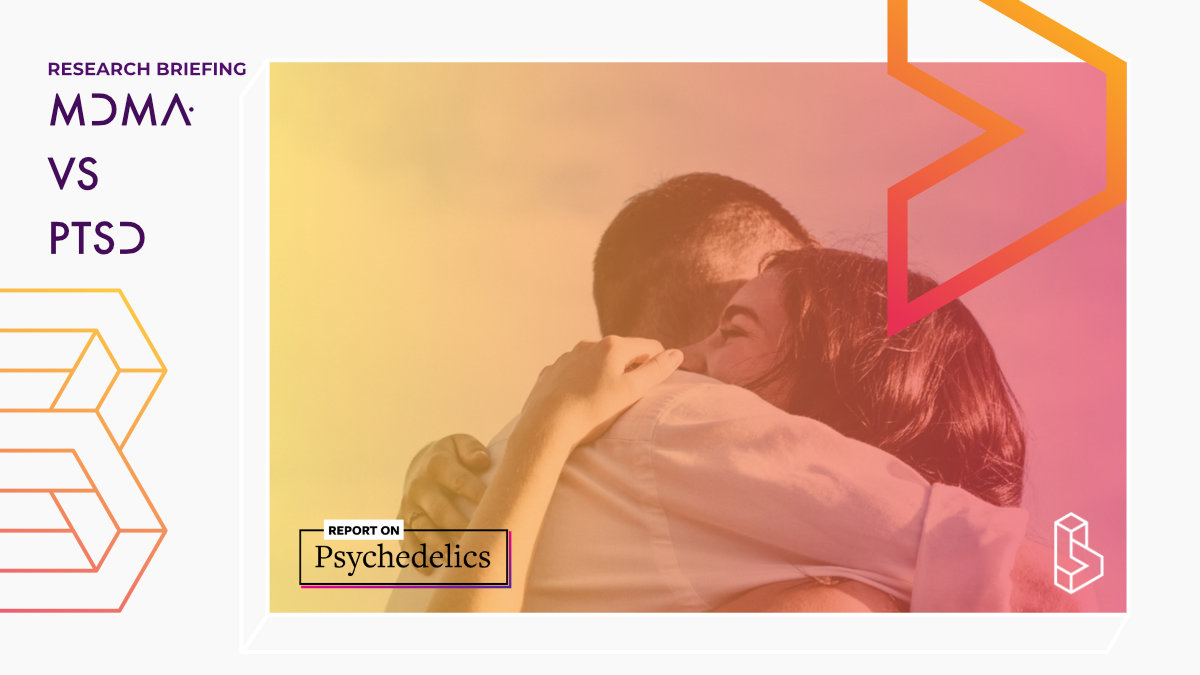This research briefing is co-published with the excellent Report on Psychedelics.
May 12th 2021
In The Research Briefing:
- MAPS reports a successful trial of MDMA-assisted therapy for PTSD
- Moving past mysticism in psychedelic research
- Psychedelic users appear to be more resilient in the face of Covid
MDMA
Phase 3 trial shows outstanding positive results
A study sponsored by MAPS, is the first phase 3 trial of any psychedelic to take place. It compares the effectiveness of MDMA plus therapy, against that of only therapy (and a placebo pill). Over the course of 18 weeks, participants in the study were measured on scores of PTSD with the CAPS-IV measure. On average, their scores dropped from 44 to 20, a reduction of over 50%.
Worth repeating highlights from Monday‘s Briefing
- An incredible 67% of participants with PTSD who received three MDMA-assisted therapy sessions no longer had a PTSD diagnosis post-treatment.
- 88% had a “clinically meaningful reduction in symptoms”
- The 42 patients who received MDMA had lower scores on a measure of suicidality than those who received the placebo.
The results above are not only impressive in their own right. They compared favorably to antidepressants (SSRIs), which can (temporarily) help up to 50% of patients in the best case. The authors note that MDMA lets someone recall negative memories with more self-compassion. MDMA also increased the bond between the patient and therapist. Both help to lead to this amazing result.
What’s Next
Future studies will investigate the long-term outcomes. The outlook here is positive, as in the phase 2 study, the results were even better 12 months later. MAPS is currently leading the final effort in the second part of the phase 3 study to get MDMA-assisted therapy approved by 2023.
MYSTICISM
Do we need to rethink the mystical experience?
Those who use psychedelics often say the experience was indescribable, ineffable, or beyond this world. To capture it in one word, mystical. In psychedelic studies, this is often measured with the Mystical Experience Questionnaire (MEQ). And this questionnaire does predict therapeutic outcomes. Participants who score higher on the MEQ have more enduring positive life changes.
But at the same time the ‘mystical experience’ creates a black box, a place where science can’t reach. And it creates a framework through which researchers and lay people alike now see the psychedelic experience. An opinion article argues that we should move past the mystical, to find a deeper, and more empirical, explanation of the psychedelic experience.
Why should we rethink the mystical experience?
- By framing an experience (under psychedelics) as mystical, we leave no room for other explanations.
- The mystical framework stems from a time when we didn’t have our current scientific tools. We now have access to brain scans, placebo-controlled studies, and other modes than psychedelics (e.g. meditation) to create these types of experiences.
- Only by letting go of the ineffable, we open up ourselves to examine the components what happens at the peak of a psychedelic experience, and how that leads to positive therapeutic outcomes.
The authors of this paper are optimistic that we’re able to better understand how and why psychedelics work. For instance, the REBUS model, finds a neurological connection between changes in the brain and experiences such as feeling connected. A more secular framing of the psychedelic experience may help us find deeper explanations of how our brains work and shape our lived experience.
COVID
Better mental health for those who use psychedelics
Multiple studies have looked at the mental health of those who use psychedelics in comparison to the rest of the population. Instead of finding them to be damaging, the researchers found an association between psychedelics and lower rates of mental health problems.
The current survey study investigated this question with regards to Covid. Would those who use psychedelics (32% of the 5618 participants) be better of or not? A survey study isn’t able to say much about the causation, but is able to say what correlations they found.
How do the psychonauts compare to the rest of the participants?
- Psychedelic users (mainly LSD and magic mushrooms) had better mental health indicators
- Lifetime use of psychedelics was linked to increased openness and extraversion
- Those who used psychedelics scored higher on an aggregate of personality measures that has been linked to plasticity.
Are those who use psychedelics just happier in general, or is there something about the use of psychedelics themselves that (partially) protects them from the negative mental health effects? As we’ve seen with the MDMA above, the evidence points towards the second part also being a real possibility.
Research Report Readout
How do we translate MDMA research from the lab to the therapists office. This commentary looks at expectancy effects, patient characteristics, outcomes measures, and more.
The anterior cingulate cortex is a key locus of ketamine’s antidepressant action. The changes in the anterior cingulate cortex (AAC, connected to reward and emotion) are what drives the outcomes, argues this review.
Become a psychedelic insider
Get a Pro Membership to enjoy these benefits & support Blossom📈 full reports on Topics & Compounds
🧵 full summary reviews of research papers
🚀 full access to new articles
See Memberships

